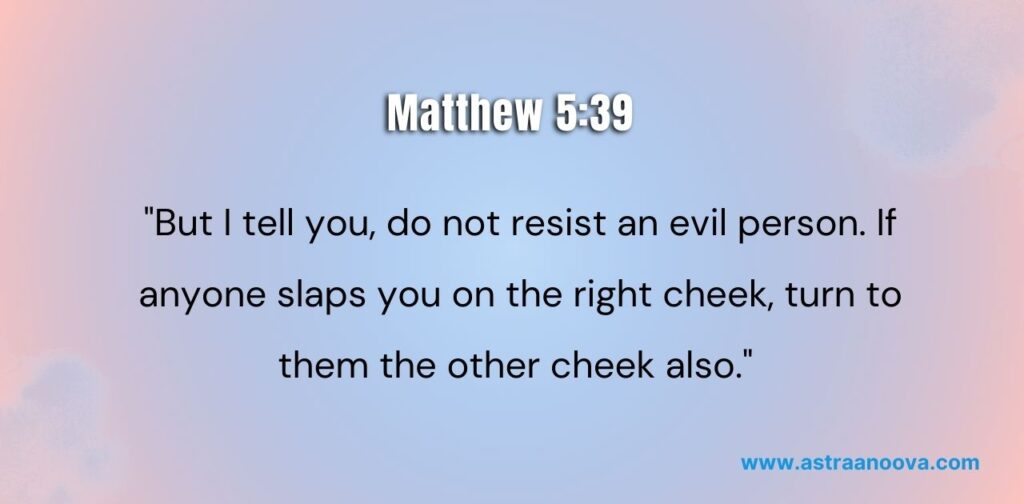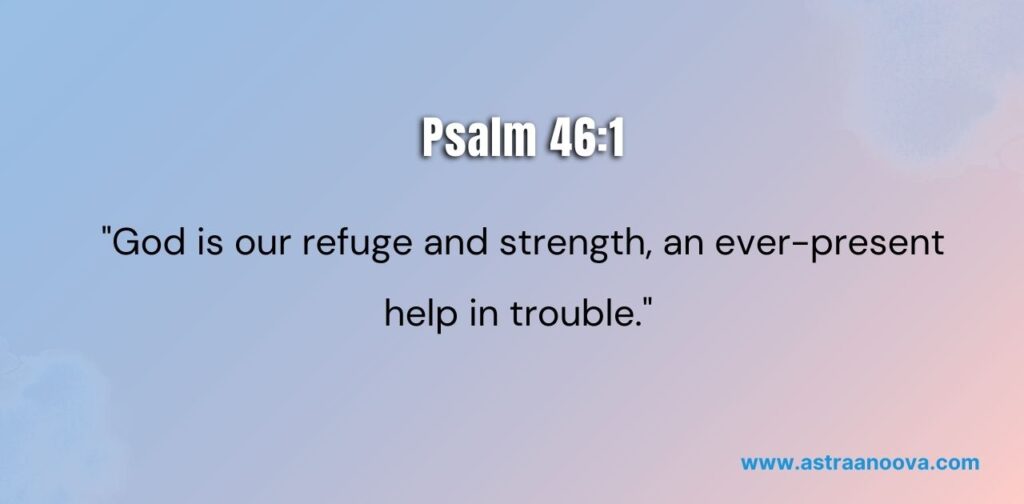In today’s challenging world, many Christians grapple with questions about self-defense while staying true to their faith. Whether facing physicmeaal threats, spiritual battles, or moral dilemmas, the Bible offers profound guidance on protecting ourselves and others while maintaining our integrity.
Bible Verses About Defending Yourself
The topic of self-defense in Christianity often brings to mind seemingly contradictory concepts Jesus‘s teaching about turning the other cheek versus the Old Testament’s clear provisions for self-protection. However, a deeper study reveals a beautifully balanced approach that honors both peace and protection.
As we explore these Bible verses about self-defense, we’ll discover how divine wisdom provides practical guidance for navigating modern challenges while maintaining our faith in God. From David‘s courage against Goliath to Paul‘s teachings on spiritual warfare, the Bible offers rich insights into handling conflict with wisdom and grace.
Let’s explore these powerful verses and their timeless applications.
Exodus 22:2-3 – Biblical Justifications for Self-Defense
“If a thief is caught breaking in at night and is struck a fatal blow, the defender is not guilty of bloodshed; but if it happens after sunrise, the defender is guilty of bloodshed.”
This fascinating passage presents one of the Bible’s clearest guidelines on self-defense. God recognizes that defending oneself and one’s family against nighttime intruders differs from daytime confrontations. At night, when intentions are unclear and visibility is limited, the law granted more latitude for defensive actions. This verse shows God’s practical wisdom acknowledging both the right to self-defense and the need for reasonable limits.
Matthew 5:39 – Turning the Other Cheek: What Jesus Really Meant
Jesus’s famous teaching about turning the other cheek often sparks debate about self-defense.
“But I tell you, do not resist an evil person. If anyone slaps you on the right cheek, turn to them the other cheek also.”

Understanding the cultural context reveals deeper meaning a slap on the right cheek was meant as an insult, not a serious physical attack. Jesus teaches us to respond to personal insults with dignity rather than escalating minor conflicts into violence.
Psalm 91:4-5 – The Role of Faith in Personal Protection
“He will cover you with his feathers, and under his wings you will find refuge; his faithfulness is a shield and buckler. You will not fear the terror of the night, nor the arrow that flies by day.”
This beautiful metaphor reveals a profound truth about divine protection. Like a mother bird sheltering her chicks, God offers both physical and spiritual protection to those who trust in Him. The imagery of shields and bucklers speaks to practical defense, while the promise of fearlessness addresses our emotional security. Today’s believers can find comfort knowing that faith serves as an essential component of personal protection.
Proverbs 24:11-12 – Scriptural Perspectives on Protecting Others
“Rescue those being led away to death; hold back those staggering toward slaughter.”
This powerful verse extends beyond self-defense to our moral obligation to protect others. It calls believers to active intervention when witnessing injustice or danger to others. This scripture reminds us that true Christian protection isn’t just about personal safety it’s about standing up for those who cannot defend themselves.
Psalm 46:1 – God as Protector: Verses that Provide Assurance
“God is our refuge and strength, an ever-present help in trouble.”

This verse serves as a cornerstone for understanding divine protection. It presents God as both a defensive fortress and an active helper in times of need. Modern believers can draw strength from knowing that alongside practical defensive measures, they have access to supernatural protection through their faith.
Proverbs 31:8-9 – Defending the Weak and Vulnerable: Biblical Instructions
This passage commands us to “Speak up for those who cannot speak for themselves, for the rights of all who are destitute.”
Here we see how biblical self-defense extends to advocacy for others. The verse challenges believers to move beyond personal protection to become active defenders of justice in their communities.
John 2:15 – Jesus’ Actions in the Temple: A Case of Righteous Indignation
When Jesus drove the money changers from the temple, He demonstrated that there are times when forceful action aligns with godly purpose.
This story illustrates how righteous anger and protective actions can serve holy purposes. However, note that Jesus’s actions were measured and specifically targeted at stopping exploitation, not causing harm.
READ ALSO: 30 Positive Bible Verses for the Day
Nehemiah 4:14 – Lessons from Nehemiah: Building and Defending
Nehemiah’s remarkable leadership during Jerusalem’s wall reconstruction provides practical wisdom about combining productive work with defensive preparation. He encouraged the people:
“Don’t be afraid of them. Remember the Lord, who is great and awesome, and fight for your brothers, your sons, your daughters, your wives, and your homes.”
Proverbs 15:1 – Using Words as Defense: Wisdom from Proverbs
“A soft answer turns away wrath, but a harsh word stirs up anger.”
This verse presents a sophisticated form of self-defense through wise communication. Often, the best defense involves de-escalation rather than confrontation. This principle remains remarkably relevant in today’s conflict resolution strategies.
Acts 24:10 – Legal Defense in the Bible: Examples from Moses to Paul
Paul’s defense before Felix demonstrates how believers can engage with legal systems respectfully while standing firm in their rights. His approach shows that self-defense can include utilizing established legal processes with dignity and wisdom.
Psalm 91:11 – Angels as Protectors: Biblical Accounts
“For he will command his angels concerning you to guard you in all your ways.”
This verse unveils the supernatural dimension of divine protection. While we take practical steps for safety, this scripture reminds us of unseen guardians working on our behalf. It’s particularly comforting for believers facing situations beyond human control.
Matthew 10:19 – Biblical Strategies for Handling Accusations
“When they deliver you over, do not be anxious how you are to speak or what you are to say, for what you are to say will be given to you in that hour.”
Here’s practical guidance for defending oneself against false accusations. Jesus promises divine wisdom in moments of confrontation, teaching us to trust God’s guidance while preparing ourselves wisely.
Matthew 5:9 – Peaceful Resolution: When to Defend and When to Yield
“Blessed are the peacemakers, for they shall be called sons of God.”

This beatitude presents a crucial balance in self-defense. While protecting ourselves is important, seeking peaceful solutions should be our first response. Modern conflict resolution often reflects this biblical wisdom, emphasizing de-escalation before physical defense.
Isaiah 1:17 – The Christian Response to Injustice and Oppression
“Learn to do good; seek justice, correct oppression; bring justice to the fatherless, plead the widow’s cause.”
This verse provides a framework for addressing systemic injustice. It calls believers to active engagement in defending others, showing that biblical self-defense extends to social justice advocacy.
1 Peter 3:16 – Ethical Dilemmas: Defending Yourself Without Sinning
“Having a good conscience, so that, when you are slandered, those who revile your good behavior in Christ may be put to shame.”
Peter offers wisdom about maintaining moral integrity while under attack. The best defense often proves to be a consistently righteous life that refutes false accusations through its evident goodness.
Ephesians 6:11 – The Armor of God: Spiritual and Physical Defense
“Put on the full armor of God, so that you can take your stand against the devil’s schemes.”
Paul’s famous metaphor of spiritual armor demonstrates how physical and spiritual defense intertwine. Each piece of armor corresponds to both practical and spiritual protection:
Truth as a belt foundational integrity Righteousness as a breastplate moral protection Gospel of peace as footwear stable standing Faith as a shield protection against doubt and fear Salvation as a helmet guarding our thoughts Word of God as a sword – both defensive and offensive tool
1 Peter 3:4 – The Strength of Gentleness: Defending Yourself with Grace
The Bible uniquely presents gentleness as a form of strength, not weakness.
This “imperishable beauty of a gentle and quiet spirit” proves powerful in defusing conflicts and maintaining dignity under pressure.
Modern conflict resolution experts often echo this ancient wisdom about the effectiveness of gentle strength.
Ephesians 5:11 – Confronting Evil: Guidance from the Epistles
“Take no part in the unfruitful works of darkness, but instead expose them.”

This verse presents a proactive approach to defense exposing wrongdoing rather than merely avoiding it. In today’s world, this might mean speaking up about workplace harassment or reporting criminal activity. The principle balances non-participation in evil with responsible action to combat it.
Psalm 91:1-2 – Prayers for Protection: Invoking Divine Intervention
“He who dwells in the shelter of the Most High will abide in the shadow of the Almighty. I will say to the LORD, ‘My refuge and my fortress, my God, in whom I trust.'”
This psalm introduces the concept of spiritual dwelling making God’s presence our habitual refuge. It’s not just about occasional prayers for protection but maintaining constant communion with our divine protector.
Proverbs 24:5 – Defensive Wisdom: Learning from Biblical Leaders
“A wise man is full of strength, and a man of knowledge enhances his might.”
This proverb reveals how wisdom multiplies physical strength. In self-defense contexts, this means strategic thinking often proves more valuable than raw power. Modern security experts often emphasize awareness and prevention over physical confrontation.
1 Samuel 17:45 – King David: Warrior and Defender in the Bible
David’s confrontation with Goliath exemplifies faith-based courage:
“You come against me with sword and spear and javelin, but I come against you in the name of the LORD Almighty.”
This story teaches that true strength combines practical preparation (David’s sling skills) with spiritual confidence.
Proverbs 12:17 – Maintaining Integrity Under Attack
“Whoever speaks the truth gives honest evidence, but a false witness utters deceit.”
Even under pressure, maintaining truthfulness provides the best long-term defense. This verse reminds us that compromising integrity for short-term protection often backfires.
What Does the Bible Say About Defending Yourself
The Bible’s teaching on self-defense reveals several key principles:
- Proportional Response: God’s Word consistently advocates measured responses to threats. The distinction between nighttime and daytime defense in Exodus shows this clearly. Modern applications might include using reasonable force for protection while avoiding excessive retaliation.
- Priority of Peace: Scripture emphasizes pursuing peaceful solutions first. Jesus’s teaching about turning the other cheek doesn’t prohibit all self-defense but encourages seeking non-violent resolutions when possible.
- Protection of Others: Biblical self-defense extends beyond personal safety to protecting vulnerable people. This principle appears throughout Scripture, from Moses’s intervention for the Hebrew slaves to Paul’s advocacy for gentile believers.
- Spiritual Dimension: Physical defense connects intimately with spiritual warfare. The Bible teaches believers to combine practical precautions with spiritual preparation through prayer, faith, and righteous living.
Practical Modern Applications
Today’s believers can apply these principles through:
- Developing situational awareness
- Learning appropriate self-defense techniques
- Building strong community connections
- Maintaining active prayer lives
- Supporting justice initiatives
- Creating family safety plans
- Engaging in conflict resolution training
Final Thoughts
The Bible’s teaching on self-defense offers a balanced approach combining practical wisdom with spiritual truth. It neither promotes pacifism that ignores genuine threats nor advocates unbridled aggression. Instead, scripture guides us toward responsible protection of ourselves and others while maintaining Christian character.
Modern Christians can find confidence knowing that biblical principles of self-defense remain relevant and practical. Whether facing physical threats, verbal attacks, or spiritual warfare, God’s Word provides wisdom for protection while preserving our witness for Christ.
Remember, true security comes not just from physical preparation but from dwelling in God’s presence, as Psalm 91 beautifully expresses. When we combine practical wisdom with spiritual faith, we find the balance needed for effective and godly self-defense in today’s challenging world.
FAQ’s
What does the Bible say about defending yourself?
The Bible supports justified self-defense while emphasizing peaceful solutions first, as shown in Exodus 22:2-3. It teaches using proportional force when necessary while maintaining Christian values and seeking peaceful resolutions when possible.
What does God say about being defensive?
God’s Word encourages wise defense rather than reactive defensiveness. Scripture promotes standing firm in faith (Ephesians 6:11) while maintaining gentleness and self-control, as demonstrated in Proverbs 15:1 about using soft answers to turn away wrath.
What does the Bible say about guarding ourselves?
Scripture emphasizes both physical and spiritual protection, as outlined in Ephesians 6:11-18. It teaches vigilance in protecting our hearts, minds, and bodies while trusting in God’s protection and guidance.
What does the Bible say about defending those who can’t defend themselves?
Proverbs 31:8-9 clearly commands believers to speak up for those who cannot speak for themselves and defend the rights of the poor and needy. It’s a biblical mandate to protect the vulnerable and stand against injustice.
What is Proverbs 4:23?
“Above all else, guard your heart, for everything you do flows from it.“ This verse emphasizes protecting our inner spiritual and emotional well-being as the source of our actions and decisions.
What is Romans 12:17?
“Do not repay anyone evil for evil. Be careful to do what is right in the eyes of everyone.“ This verse teaches responding to wrongdoing with righteousness rather than revenge.
What does Luke 11:21 say?
“When a strong man, fully armed, guards his own house, his possessions are safe.“ This verse acknowledges the legitimacy of protecting one’s home and family through appropriate preparation.
What is Psalm 144:1?
“Praise be to the Lord my Rock, who trains my hands for war, my fingers for battle.“ This verse recognizes God’s role in preparing us for both spiritual and physical battles while acknowledging Him as the source of our strength.
Read Also: 25+ Bible Verses about Fellowship (with Related Verses)

Multilingual faith educator exploring connections between language, spirituality, and dream symbolism.


















